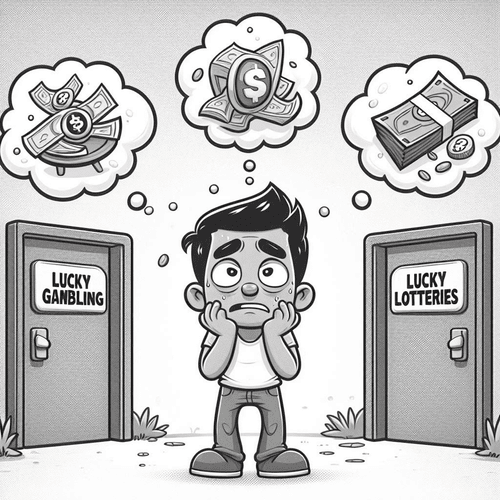Gambling and Lotteries: Sin or Spin?
Gambling and lotteries are pervasive in modern society and are often portrayed as harmless fun or easy ways to achieve wealth. However, as Christians we’re to evaluate these practices, giving careful heed to biblical principles and ethical implications. Let’s explore whether gambling and lotteries are compatible with Christian values and with scripture.
Understanding Gambling and Lotteries: Gambling and lotteries involve risking money or valuables on an event with an uncertain outcome, primarily driven by chance. While the allure of quick riches is enticing, these practices often raise significant ethical and moral questions, especially for those who strive to live according to biblical teachings.
The Biblical View on Wealth and Stewardship: The Bible offers clear guidance on how Christians should view wealth and stewardship. Jesus warns against the love of money, stating, “No one can serve two masters… You cannot serve both God and money” (Matthew 6:24). Additionally, Paul instructs Timothy, “For the love of money is a root of all kinds of evil” (1 Timothy 6:10). These verses emphasize that the pursuit of wealth should not overshadow our devotion to God.
Gambling and Lotteries: Their Impact on Stewardship: Gambling and lotteries often encourage a mindset that conflicts with biblical stewardship. The Bible teaches that we are to be wise and responsible stewards of the resources God has entrusted to us (Matthew 25:14-30). Gambling, by its nature, promotes a get-rich-quick mentality, which can lead to poor financial decisions, debt, and neglect of one’s responsibilities. Proverbs 13:11 cautions, “Dishonest money dwindles away, but whoever gathers money little by little makes it grow.” This highlights the value of diligent, honest work over the reckless pursuit of wealth.
Ethical Implications of Gambling and Lotteries: Gambling can lead to numerous social and ethical issues, such as addiction, financial ruin, and broken relationships. The Bible calls Christians to love their neighbours and seek their well-being (Mark 12:31). Gambling, however, often exploits vulnerable individuals, leading to personal and familial hardships. By participating in or endorsing gambling, Christians may inadvertently support an industry that profits from the misfortune of others.
Contentment and Trust in God’s Provision: The Bible encourages believers to find contentment in God’s provision rather than seeking wealth through dubious means. Hebrews 13:5 advises, “Keep your lives free from the love of money and be content with what you have, because God has said, ‘Never will I leave you; never will I forsake you.'” Trusting in God’s provision allows Christians to focus on eternal values rather than transient riches.
Avoiding the Appearance of Evil: Christians are called to avoid even the appearance of evil (1 Thessalonians 5:22). Engaging in gambling can compromise a believer’s witness, leading others to question their values and commitment to living a life set apart for God. Maintaining a clear testimony is essential for effective ministry and evangelism.
Alternatives to Gambling: Instead of gambling, Christians can seek wholesome and God-honouring activities that promote community, stewardship, and charity. Investing time and resources in meaningful pursuits, such as volunteering, supporting charitable causes, and engaging in productive work, aligns more closely with biblical teachings.
Quick Qs:
- What does the Bible say about gambling?
The Bible does not explicitly prohibit gambling in a specific verse or command. However, the Bible does provide principles that guide Christians away from such practices, emphasizing stewardship, contentment, and ethical conduct. - Is playing the lottery sinful?
Playing the lottery may be considered incompatible with Christian values, given its association with greed, poor stewardship, and the potential to harm individuals and families. - How can Christians approach the topic of gambling with non-believers?
Christians can approach the topic with compassion, sharing biblical principles about stewardship and contentment, and highlighting the potential social and ethical issues associated with gambling. - Are there forms of gambling that are acceptable for Christians?
Given the ethical concerns and biblical principles, Christians would do well to avoid gambling, and focus instead on responsible stewardship and godly contentment. - What are some alternatives to gambling for entertainment?
Christians can engage instead in wholesome activities such as volunteering, church events, time with family, and hobbies that align with their values.
Conclusion
Gambling and lotteries, with their inherent risks and ethical concerns, are not compatible with Christian values. The Bible calls believers to be wise stewards, content with God’s provision, and mindful of their testimony to others. By rejecting gambling and embracing responsible, godly stewardship, Christians can honour God and promote the well-being of their communities.
Related Reads:
Editor's Pick

Why Do People Hate the Doctrine of Election?
…WHEN THEY REALLY SHOULDN’T Few Bible doctrines provoke stronger reactions than election. The idea that God chose some for salvation [...]

The Doctrine of Providence: Does God Really Govern All Things?
You’re sitting in the doctor’s office when the diagnosis lands like a thunderclap. Your mind races: Why this? Why now? [...]

No Decay, No Defeat: What It Means That Christ’s Body Saw No Corruption
On the Day of Pentecost, Peter stood before thousands and made a startling claim: David's body decayed in the tomb, [...]
SUPPORT US:
Feel the Holy Spirit's gentle nudge to partner with us?
Donate Online:
Account Name: TRUTHS TO DIE FOR FOUNDATION
Account Number: 10243565459
Bank IFSC: IDFB0043391
Bank Name: IDFC FIRST BANK






